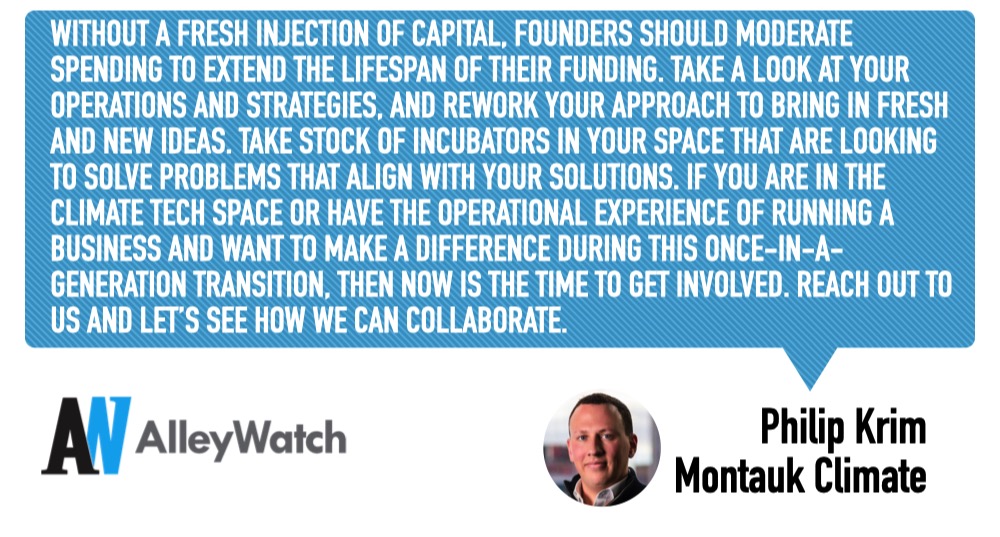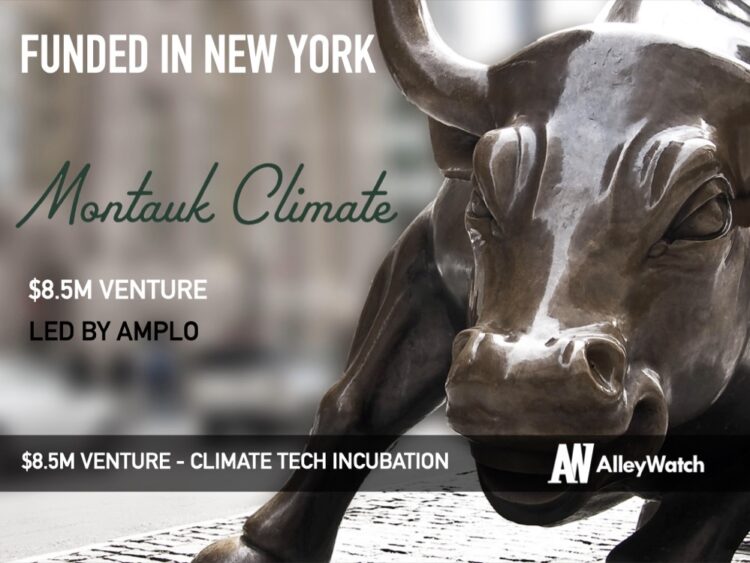The Inflation Reduction Act is anticipated to channel over $500B into climate technologies over the next decade, aiming to reduce carbon emissions. Companies that adeptly navigate this market quickly and build climate tech solutions stand to benefit significantly. Montauk Climate, a climate tech-focused incubator, aims to foster category-defining companies in the climate space, spanning energy transition, infrastructure, and sustainability. Founded by the CEO and Cofounder of Casper, the company is supported by a leading team of climate experts and investors that have built a combined 30 years of expertise in this nascent space. Montauk Climate collaborates with experienced founders, providing them with the main premise for the business, resources to navigate regulatory challenges, capital, and a strategic playbook to seize market opportunities. Although Montauk has not disclosed the names of the companies currently under incubation, the initial batch is focused on the intersection of climate tech and energy use in data centers, electrification, weather data aggregation, and insurance.
AlleyWatch caught up with Montauk Climate Cofounder and CEO Philip Krim to learn more about the business, the company’s strategic plans, recent round of funding, and much, much more…
Who were your investors and how much did you raise?
$8.5M in operational funding led by Amplo Founder and Managing Partner, Sheel Tyle.
Tell us about the product or service that Montauk Climate offers.
We are an incubator dedicated to creating technology companies at the forefront of climate tech, infrastructure, and energy transitions. We’re not your typical climate VC. We author the concepts in-house and put together a playbook for an experienced founder to run the team and build the best possible solution. We surround our founders with a team of industry experts and advisors to bring the concept to market efficiently and provide their teams with ongoing support so they can scale quickly and maximize impact.
What inspired the start of Montauk Climate?
 We cannot understate the opportunity. By 2030 the energy market is projected to reach over $3T. Clean energy investments are growing at an annual rate of nearly 15%. Over 30 million new jobs will be created in the renewable energy sector over the next few years.
We cannot understate the opportunity. By 2030 the energy market is projected to reach over $3T. Clean energy investments are growing at an annual rate of nearly 15%. Over 30 million new jobs will be created in the renewable energy sector over the next few years.
Simply put, the world is at an inflection point – the energy sector is transitioning from traditional, pollutive systems to efficient, decentralized ones, driven by electrification, grid improvements, regulatory changes for carbon management, and the integration of AI and clean tech, creating a once-in-a-generation opportunity in an evolving landscape.
I’m the former CEO and Chairman of Casper and I bring deep expertise in incubating and investing in early-stage tech companies such as Affirm, Masterclass, Ramp, Reddit, Relativity Space, Ro, and many other early-stage companies. Recently I cofounded Haven Energy, a climate tech startup that has raised over $11M in total funding.
My cofounders deepen the expertise bench. CIO Evan Caron brings more than two decades of expertise in the energy and commodities sector to Montauk Climate, having held energy and renewable-related positions at Riverstone, Deutsche Bank, Mercuria, and Trailstone. COO Sharo Atmeh managed one of the first public climate-tech investing platforms in the nation as Portfolio Manager and Head of ESG and Event-Driven at Alyeska Investment Group. Sharo also helped establish the leading national advisor to Fortune 100 companies on sustainability and stakeholder matters including ESG, activism defense, and unsolicited M&A.
Combined, this team has over three decades of experience in the climate technology industry with investments totaling over $1.3B in climate tech across the public and private sectors.
As far as we are concerned, we are only just getting started.
How is Montauk Climate different?
We are one of the first incubators exclusively building technology companies at the forefront of climate, infrastructure, and energy transitions and with a focus on bringing in experienced founders and talent to tackle these issues.
Progress in climate tech is held back by a lack of experienced founders and we consider this a significant differentiation in how our approach stands out: we author the businesses in-house, develop the playbook, and bring in the experienced founders with the operational know-how to be successful.
We also leverage the support of our advisory board, composed of industry experts including Adam Braun, Cofounder of Climate Club; Kiran Bhatraju, CEO of Arcadia; Corey Capasso, CEO of Urbint; Dr. John Clippinger, Co-founder BioForm Labs; Chris Kemper, CEO of Palmetto Energy; Ryan Pripstein, Former Head of Thrive Capital Incubator; JD Ross, Co-rounder of OpenDoor; Arcady Sosinov, CEO of Freewire, and more.
Lastly, many climate tech companies tackle issues that need hardware solutions. These are noble and necessary and a lot of core science is already developed and underway. However, our approach is about what we do with this tech. We develop businesses that enhance those efforts by making connections among consumers, utilities, renewables, and other stakeholders. Our goal is to streamline what is currently a fragmented system, making it operational and efficient.
What market does Montauk Climate target and how big is it?
The market opportunity to address climate tech, infrastructure, and energy is historic. If you are reading this, you likely will not see a similar transition again in your lifetime.
The energy sector alone is projected to reach over $3T by 2030. In 2023, over $50B in venture capital and private equity was allocated to climate-tech startups, resulting in the US being the best-funded climate-tech startup market for the third year in a row. The Department of Energy estimates that US businesses lose out on $150B a year of related expenses to power outages making the energy transition sector a large market of opportunity and change.
The market opportunity to address climate tech, infrastructure, and energy is historic. If you are reading this, you likely will not see a similar transition again in your lifetime.
The energy sector alone is projected to reach over $3T by 2030. In 2023, over $50B in venture capital and private equity was allocated to climate-tech startups, resulting in the US being the best-funded climate-tech startup market for the third year in a row. The Department of Energy estimates that US businesses lose out on $150B a year of related expenses to power outages making the energy transition sector a large market of opportunity and change.
Making an impact within climate, infrastructure, and energy is a complex and nuanced process, which requires not only more financing, including capital and mass deployment funds, but also changes in policy, standards, and increased cooperation across various organizations and sectors. We connect those dots and create technology companies across sectors that are backed and guided by operators who know how to scale a business.
What’s your business model?
We’re an incubator model, also commonly referred to as a studio. We author the businesses in-house and retain the investment as our companies grow and scale.
What are the milestones you plan to achieve in the next six months?
We have a handful of portfolio companies advancing toward fundraising at the intersection of climate tech and energy use in data centers, electrification, weather data aggregation, and insurance. We’re excited to share news here soon.
What advice can you offer companies in New York that do not have a fresh injection of capital in the bank?
Without a fresh injection of capital, founders should moderate spending to extend the lifespan of their funding. Take a look at your operations and strategies, and rework your approach to bring in fresh and new ideas. Take stock of incubators in your space that are looking to solve problems that align with your solutions. If you are in the climate tech space or have the operational experience of running a business and want to make a difference during this once-in-a-generation transition, then now is the time to get involved. Reach out to us and let’s see how we can collaborate.

Where do you see the company going now over the near term?
We’re thrilled to make our incubator public and announce the funding that will accelerate our work in the near term. For now, we are focused on launching our first set of portfolio companies, deepening our research into climate tech, infrastructure, and energy transitions, and continuing to identify go-to-market solutions that address the most pressing climate technology challenges.
What’s your favorite restaurant in the city?
Elio’s –– You cannot go to New York and not have great Italian.





